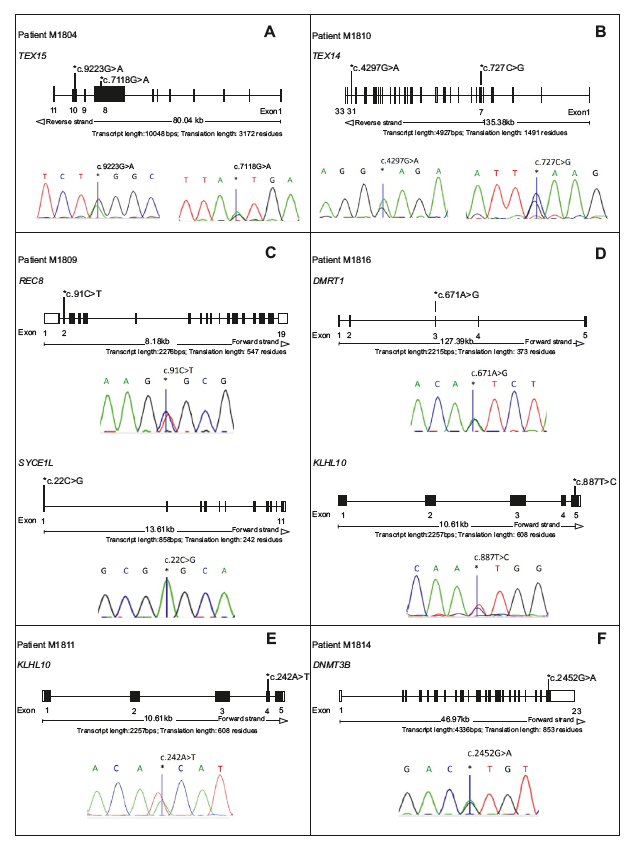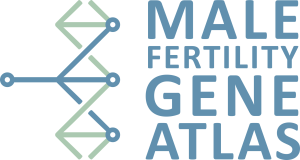Sequence analysis of 37 candidate genes for male infertility: Challenges in variant assessment and validating genes
Thais Fenz Araujo, Corinna Friedrich, Carlos Henrique Paiva Grangeiro, Lucia Regina Martelli, J D Grzesiuk, Jana Emich, Margot Julia Wyrwoll, Sabine Kliesch, Aguinaldo Luíz Simões, Frank Tüttelmann, 03.09.2019
Abstract
Background:The routine genetic analysis for diagnosing male infertility has not changed over the last twenty years, and currently available tests can only determine the etiology of 4% of unselected infertile patients. Thus, to create new diagnostic assays, we must better understand the molecular and genetic mechanisms of male infertility. Although next generation sequencing allows for simultaneous analysis of hundreds of genes and the discovery of novel candidates related to male infertility, so far only a few gene candidates have enough sound evidence to support the gene–disease relationship.Objective: Since complementary studies are required to validate genes, we aimed to analyze the presence of potentially pathogenic rare variants in a set of candidate genes related to azoospermia in a hitherto understudied South American population.Subjects and Methods: We performed whole exome sequencing in a group of 16 patients with non-obstructive azoospermia from Ribeirão Preto, Brazil. Based on a recent systematic review of monogenic causes of male infertility, we selected a set of 37 genes related to azoospermia, Sertoli-cell-only syndrome and spermatogenic arrest to analyze. The identified variants were confirmed by Sanger sequencing, and their functional consequence was predicted by in silico programs.Results: We identified potential pathogenic variants in seven genes in six patients. Two variants, c.671A>G (p.Asn224Ser) in DMRT1 and c.91C>T (p.Arg31Cys) in REC8, have already been described in association with azoospermia. We also found new variants in genes that already have moderate evidence of being linked to spermatogenic failure (TEX15, KLHL10), in genes with limited evidence (DNMT3B, TEX14) and in one novel promising candidate gene that has no evidence so far (SYCE1L).Discussion: Although this study included a small number of patients, the process of rationally selecting genes allowed us to detect rare potentially pathogenic variants, providing supporting evidence for validating candidate genes associated with azoospermia.
ARAUJO, T. Fenz, et al. Sequence analysis of 37 candidate genes for male infertility: challenges in variant assessment and validating genes. Andrology, 2020, 8. Jg., Nr. 2, S. 434-441.
Publication: https://doi.org/10.1111/andr.12704
 Disclaimer
Disclaimer
The publication Sequence analysis of 37 candidate genes for male infertility: Challenges in variant assessment and validating genes by Thais Fenz Araujo, Corinna Friedrich, Carlos Henrique Paiva Grangeiro, Lucia Regina Martelli, J D Grzesiuk, Jana Emich, Margot Julia Wyrwoll, Sabine Kliesch, Aguinaldo Luíz Simões, Frank Tüttelmann is published under an open access license: https://creativecommons.org/licenses/by-nc/4.0/. Share — copy and redistribute the material in any medium or format Adapt — remix, transform, and build upon the material
Curation by the MFGA team Relevant data sets presented in the publication have been identified. If possible, annotations (title, general information, conditions, processed tissue types and processed cell types) have been added based on information from the publication. Data tables and images that provide a good overview on the publication's findings on the data set have been extracted from the publication and/or supplement. If not stated otherwise, images are depicted with title and description exactly as in the publication. Tables have been adjusted to the MFGA table format. Conducted adjustments are explained in the detailed view of the tables. However, titles and descriptions have been adopted from the publication.
Data set 1:
Exome: Whole Exome Sequencing
Species
| Species |
|---|
| Human |
Conditions
| Human phenotype ontology | Participants | Comment |
|---|---|---|
| HP:0011961: Non-obstructive azoospermia | 16 | |
| HP:control | 17 |
Data set 2: Validation
Genome: Sanger Sequencing
Species
| Species |
|---|
| Human |
Conditions
| Human phenotype ontology | Participants | Comment |
|---|---|---|
| HP:0011961: Non-obstructive azoospermia | 6 | Patients with identified variants in candidate genes. |
Images

Figure 1. Exon localization of variants identified in six NOA patients
Licensed under: https://creativecommons.org/licenses/by-nc/4.0/
